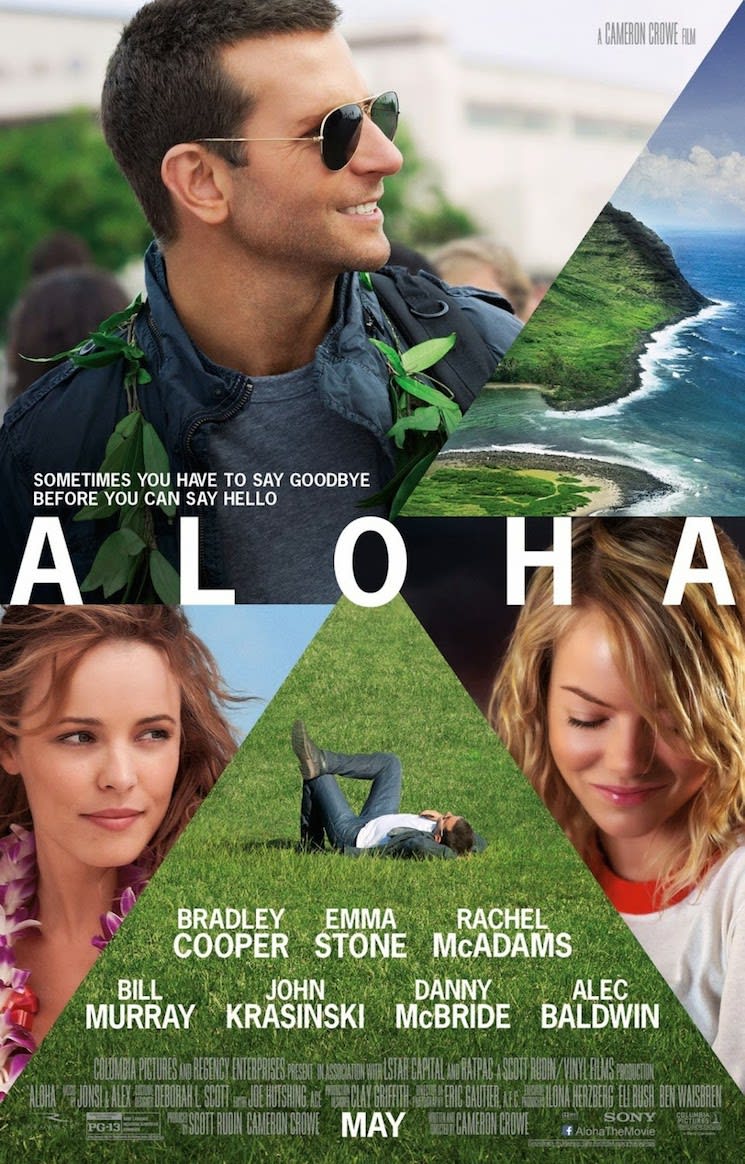This week, Cameron Crowe will finally release his follow-up to We Bought a Zoo, the family flick that we said was "riddled with plot holes and intoxicatingly cheesy moments." The film Aloha also looks like it could be intoxicatingly cheesy, but it also boasts one hell of a cast. That said, the criticisms are already rolling in. Specifically, Aloha has been accused of whitewashing Hawaiian culture.
Perhaps it's easy to forget that Hawaii isn't just the place where your uncle goes to utilize his timeshare, chow down on some Cheesecake Factory and stock up on cheap macadamia chocolates, but it's actually got a diverse and culturally rich heritage. As such, the Media Action Network for Asian-Americans has opened up about their problems with Crowe's film.
"Caucasians only make up 30 percent of the population [of Hawaii], but from watching this film, you'd think they made up 99 percent," MANAA's head Guy Aoki said in a statement to the New York Post.
"This comes in a long line of films — The Descendants, 50 First Dates, Blue Crush, Pearl Harbor — that uses Hawaii for its exotic backdrop but goes out of its way to exclude the very people who live there," Aoki continued. "It's an insult to the diverse culture and fabric of Hawaii.... How can you educate your audience to the 'rich history' of Hawaii by using mostly white people and excluding the majority of the people who live there and who helped build that history?"
Aoki's not the only one who has problems with the film's depiction of Hawaiian culture. According to the Associated Press (via The Hollywood Reporter), plenty of Native Hawaiian's are taking issue with the film's title.
"If you have a romantic comedy about the military in Hawaii... but a title that says Aloha, I can only guess that they'll bastardize the word," Walter Ritte, a Native Hawaiian activist on the island of Molokai, said. "They're taking our sacred word... and they're going to make a lot of money off of it."
Ty Kawika Tengan, chair of the ethnic studies department at the University of Hawaii's Manoa campus, added that the film's trailer and title are "typical Hollywood," where "Hawaii is the verdant background for white fantasies."
"It's been so appropriated in so many different ways — made into a commodity, made into a slogan," he added, speaking on the word in the film's title. "It gets so divorced from important indigenous Hawaiian context.... It's romanticized, literally, into a romantic comedy."
Aloha opens on Friday (May 29), and stars Bradley Cooper, Emma Stone, Rachel McAdams, Bill Murray, Alec Baldwin and others.
Perhaps it's easy to forget that Hawaii isn't just the place where your uncle goes to utilize his timeshare, chow down on some Cheesecake Factory and stock up on cheap macadamia chocolates, but it's actually got a diverse and culturally rich heritage. As such, the Media Action Network for Asian-Americans has opened up about their problems with Crowe's film.
"Caucasians only make up 30 percent of the population [of Hawaii], but from watching this film, you'd think they made up 99 percent," MANAA's head Guy Aoki said in a statement to the New York Post.
"This comes in a long line of films — The Descendants, 50 First Dates, Blue Crush, Pearl Harbor — that uses Hawaii for its exotic backdrop but goes out of its way to exclude the very people who live there," Aoki continued. "It's an insult to the diverse culture and fabric of Hawaii.... How can you educate your audience to the 'rich history' of Hawaii by using mostly white people and excluding the majority of the people who live there and who helped build that history?"
Aoki's not the only one who has problems with the film's depiction of Hawaiian culture. According to the Associated Press (via The Hollywood Reporter), plenty of Native Hawaiian's are taking issue with the film's title.
"If you have a romantic comedy about the military in Hawaii... but a title that says Aloha, I can only guess that they'll bastardize the word," Walter Ritte, a Native Hawaiian activist on the island of Molokai, said. "They're taking our sacred word... and they're going to make a lot of money off of it."
Ty Kawika Tengan, chair of the ethnic studies department at the University of Hawaii's Manoa campus, added that the film's trailer and title are "typical Hollywood," where "Hawaii is the verdant background for white fantasies."
"It's been so appropriated in so many different ways — made into a commodity, made into a slogan," he added, speaking on the word in the film's title. "It gets so divorced from important indigenous Hawaiian context.... It's romanticized, literally, into a romantic comedy."
Aloha opens on Friday (May 29), and stars Bradley Cooper, Emma Stone, Rachel McAdams, Bill Murray, Alec Baldwin and others.
